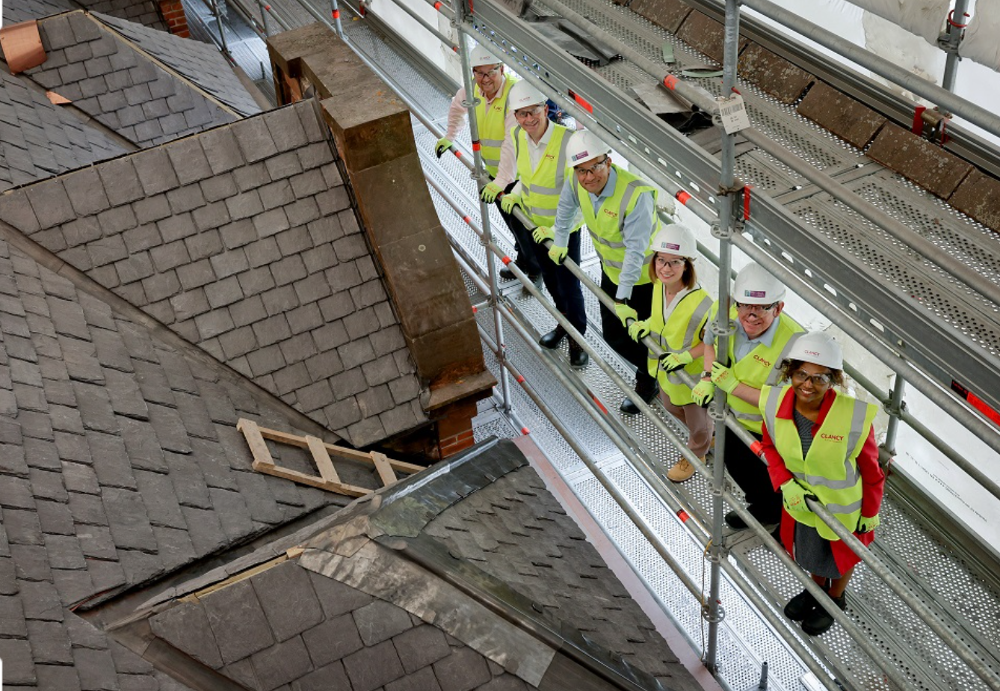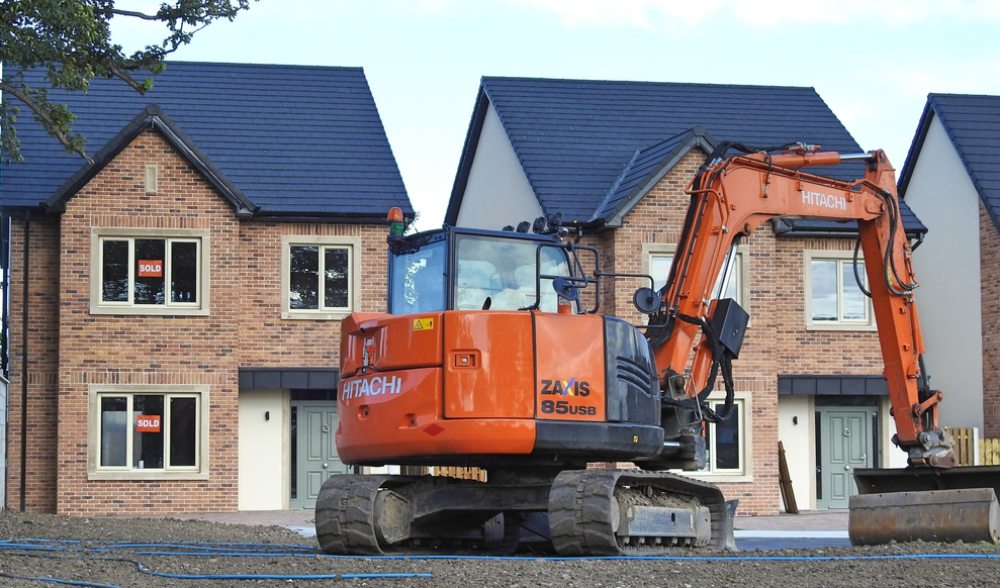There were 32,695 completions in the residential market in 2023, the highest since 2008.
A jump in the number of apartments, a recovery in the hotel market and an increase in investor appetite for the provision of student accommodation were named by Deloitte as key drivers of construction in Ireland.
In its latest annual Crane report, there were a total of 32,695 residential units completed across the country in 2023.
“Despite the positives coming through in residential construction data, it is important to note that the improvement is starting from a low base”
Apartments increased to 11,600 units in 2023, up from over 9,100 in 2022 or just 3,450 in 2019.
Meanwhile, the delivery of scheme houses remained largely unchanged with 15,500 units completed compared with 15,140 in 2022. The construction of apartments was mainly concentrated in Dublin, which accounted for over 78% of 2023’s new supply of this housing category.
Viability holds the key to home building
Kate English, economist and head of Real Estate Research with Deloitte
Residential commencements also recorded a notable rise with government policy influencing performance. A total of 32,800 units commenced construction in 2023, a 22% annual increase. This increase has continued into the start of 2024 with just under 12,000 units commenced in the first quarter. On an annual basis, this figure sits at 37,410, the highest level reached during this development cycle.
Key to this significant increase, according to the report, is the development levy waiver and water charge refund which was introduced in April 2023. Market intelligence indicates the waiver and refund scheme improve viability, making units viable that otherwise would not have been. The government has recently announced an extension of the development levy waiver until the end of 2024, and the water charge refund until the beginning of October 2024.
The report highlights how affordability is being increased for first-time-buyers (FTBs) through the government’s first home scheme and help-to-buy initiative. FTB mortgage approvals rose to 30,450 in 2023, up 9% annually and over 21% since 2019 in a trend that is likely to continue in 2024.
In contrast, the volume of mortgage approvals for mover-purchasers decreased 6.8% annually in 2023, which was 15% below 2019 levels.
“Government policy has had a positive impact on the residential market, both improving first-time buyers’ purchasing power and driving construction activity,” said Kate English, economist and head of Real Estate Research with Deloitte.
“First Time-Buyer (FTB) mortgage approvals are at a high, while the volume of approvals through the First Home Scheme has risen substantially. The challenge now is meeting this demand.
“Growing FTB demand against a backdrop of increasing yet insufficient new supply and reducing release of second-hand stock to the market, places further pressure on the residential market. This is evidenced by the increase in prices, particularly over the past six months.
“The dramatic increase in commencements can be, in part, attributed to the impact of the development levy waiver and water charge refund. The short-term measure has aided viability, making some units viable that otherwise were not. Uncertainty over whether the waiver and refund would continue has likely resulted in a spike in commencements in the first months of 2024 and may mean commencements will be moderate in the coming months.”
Post-Covid tourism boosts hotel sector
2023 marked a stellar year for the hotel sector, buoyed by air passenger arrival figures exceeding pre-Covid levels, along with a record-breaking number of domestic trips by Irish residents.
As the market improved, a number of new hospitality assets completed construction with more on the way. An estimated 1,650 new rooms were opened in 2023, and although down from 2022, this represented an improvement on 2019 levels. The majority of these completions were in Dublin, with ReZz, Premier Inn and Travelodge Plus all adding beds to their Irish portfolios.
At the start of 2024 just under 2,850 rooms were under construction across Dublin, Cork and Galway, with the majority due for delivery in 2024. Over 550 of these rooms were completed in the first quarter, a further 1,080 rooms are due to complete before the end of the year, with the remainder falling into 2025 and 2026. The completion of new stock over the coming years will bring with it new brands to the Irish hotel market. These include the Hoxton, Citizen M and Ruby Hotels.
The Deloitte report includes STR data showing the Average Daily Rate (ADR) commanded by hotels in Dublin City was €204, the highest rate since records began and 22% higher than the pre-Covid average recorded in 2019. Meanwhile, the Revenue Per Available Room (RevPAR) was €164 in 2023 in Dublin City, also a record-breaking figure, and 17% higher than the 2019 average. While rates vary considerably in the surrounding Dublin area and elsewhere in Ireland, across the board these record-breaking trends held true.
Upcoming new hotels:
| Ruby Hotel | Dublin 7 | 278 Keys |
| Citizen M | Dublin 8 | 247 Keys |
| Moxy Hotel | Cork | 201 Keys |
| The Hoxton | Dublin 2 | 129 Keys |
“There are a number of really encouraging indicators that show the recovery of the hotel market in Ireland following Covid-19, from construction activity to occupancy rates,” said John Doddy, partner and head of Real Estate at Deloitte in Ireland.
“However, it is uncertain whether this stellar market performance will continue, as occupancy, Average Daily Rate (ADR) and Revenue Per Available Room (RevPAR) each recorded a decline in the year to March 2024. Initial market soundings suggest a weakening in demand, with hotel groups citing the increased VAT rate and increased competition as key challenges facing the industry in 2024. However, several key events, such as Taylor Swift and Bruce Springsteen concerts, will likely bolster performances over the summer.”
Third level demand rockets
There were 198,970 full-time students enrolled in third level institutions in Ireland in the academic year 2022/23, the report finds. Enrolments have increased by 15% since 2014, owing to a combination of domestic demographics, increased international enrolments and an expansion in course availability.
By 2030, total enrolments in full-time third level education are estimated to be 240,000, marking an increase of 33% from 10 years prior.
An estimated 1,630 beds were added to the stock of purpose-built student accommodation (PBSA) in 2023, with Cork absorbing the largest share (814 beds).
Completions in 2024 will be more limited, as just three schemes, totalling 1,160 beds were actively on site at the start of 2024. The largest of these, Novel Bottleworks, at the former Coca Cola bottle factory on the Carrigrohane Road in Cork completed recently and is taking bookings for the 2024/2025 academic year, his bringing total stock in the Cork market to just over 7,100. The remaining beds under construction at present are based in New Harbour, Galway (345 beds) and Stoneybatter, Dublin (193 beds).
Planning applications lodged towards the end of 2023 and start of 2024 are a prime example of the renewed interest in the student accommodation sector. Planning applications of scale are located across Dublin, Cork and Waterford, through LRD applications. In total, there are over 10,900 units in the planning pipeline across plans applied and plans granted. The number that will translate into new PBSA stock remains uncertain, as SHD delays, and viability concerns weigh on some of these schemes.
Office values on decline
Office values have declined consistently since the onset of the Covid-19 pandemic, triggered by the introduction of public health restrictions and the subsequent shift towards remote working. There have been 16 consecutive quarters in which a decline has been recorded on an annual basis.
2023 saw approximately 95,400 sq m of office space delivered in Dublin, representing a decline of almost 60%. At the start of 2024, an estimated 378,000 sq m of office space was under construction. The vast majority of this is in Dublin city centre and close to 230,000 sq m is due to reach completion in 2024. Outside of Dublin, approximately 61,000 sq m of new office space is on site across Cork, Limerick and Galway.
“2024 will see a rise in the delivery of new office space and will bring with it, a rise in the vacancy rate,” English explained. “However, beyond 2024 the picture alters notably. An estimated 97,000 sq m is due to complete construction in 2025, with the remainder due in 2026. With all space due in 2026 already pre-let, the last delivery of available new stock to the market will be next year.
“The continued decline of office space being delivered to the market is noteworthy, while there are signs that indicate speculative development will return, it is uncertain when that will be. Values have declined in 2023 and are anticipated to continue to fall in the first half of the year.”
The reality is that there will need to be an increase in construction to meet the needs of Ireland’s expanding population. But English warned that barriers remain.
“There is a clear demand and need for increased activity in the construction sector, across all areas and not just in the ones focussed on in Deloitte’s Crane Survey,” she said. “This is to ensure we can continue to provide the services and spaces required for an evolving and expanding population.
“Similarly, to meet targets set by the European Building Performance Directive, extensive retrofit programmes will need to be conducted by both the public and private sector. A recent report showed that if we are to achieve the Government’s targets in housing and domestic retrofitting, Ireland will need 50,000 more people to work in construction in the next decade. To deliver this, it will require significant volumes of capital and of course, a larger workforce (of all skillsets) in the construction industry.
“Despite the positives coming through in residential construction data, it is important to note that the improvement is starting from a low base. The improvements should also not be taken for granted as challenges and indeed barriers remain. Planning and with it, the National Planning Framework review are two prime examples. Ireland’s planning system needs reform.
“While the Government has committed to ensuring the Planning and Development Bill passes before the Dáil’s summer recess, there are still many queries from stakeholders that have been left unanswered. A wholesale rewrite was always going to be an enormous undertaking, however the views of stakeholders and those tasked with implementing and working with the legislation on a day-to-day basis will be critical if we are to deliver much-needed housing.”
-
Bank of Ireland is welcoming new customers every day – funding investments, working capital and expansions across multiple sectors. To learn more, click here






